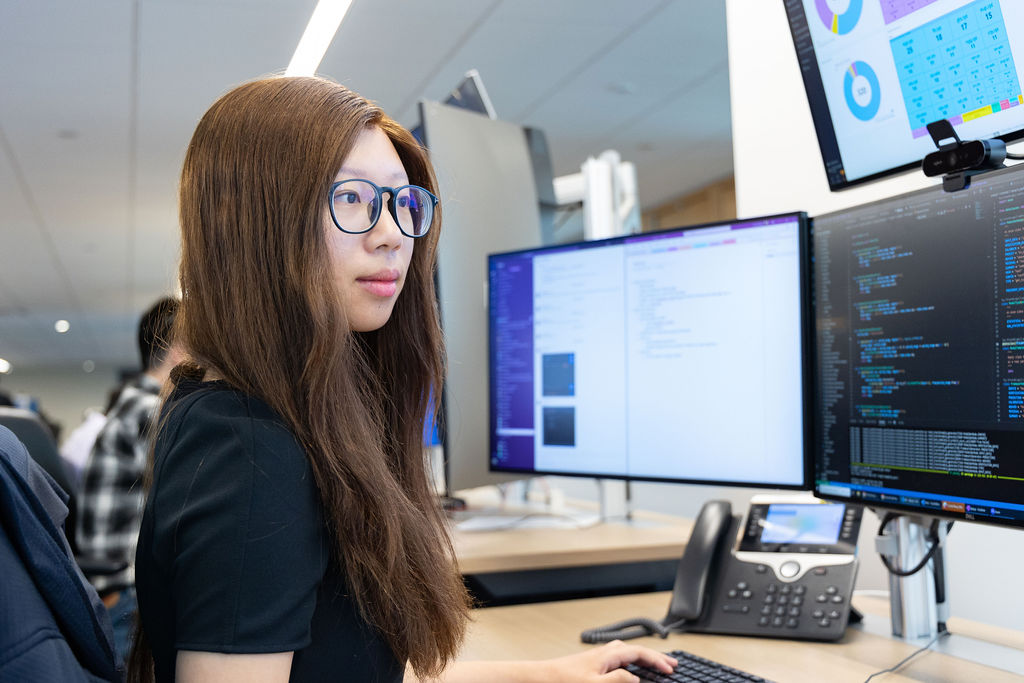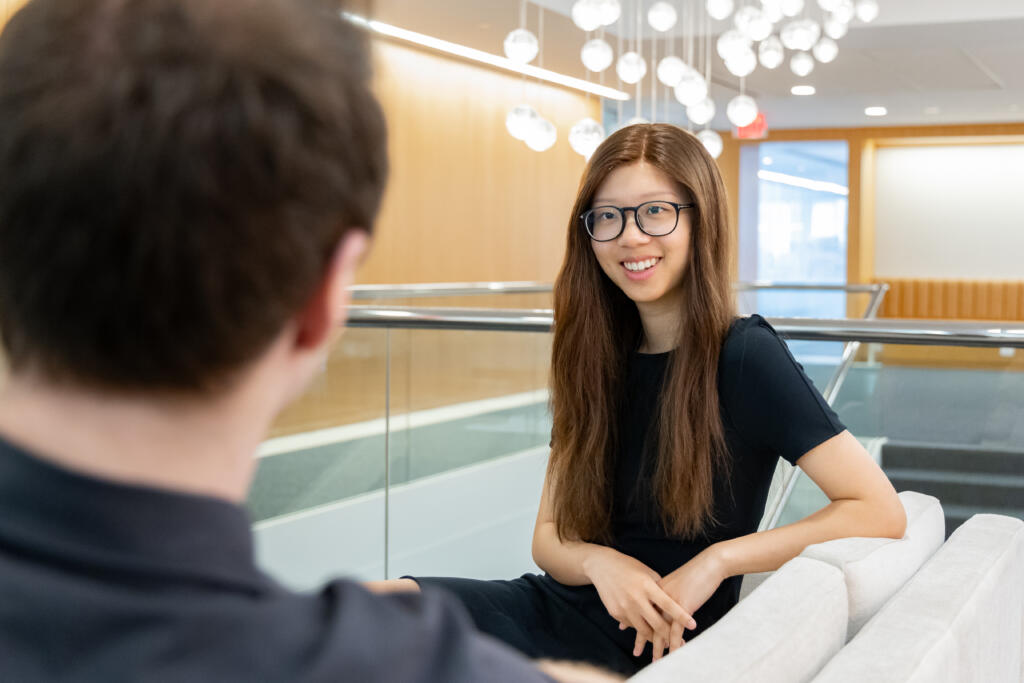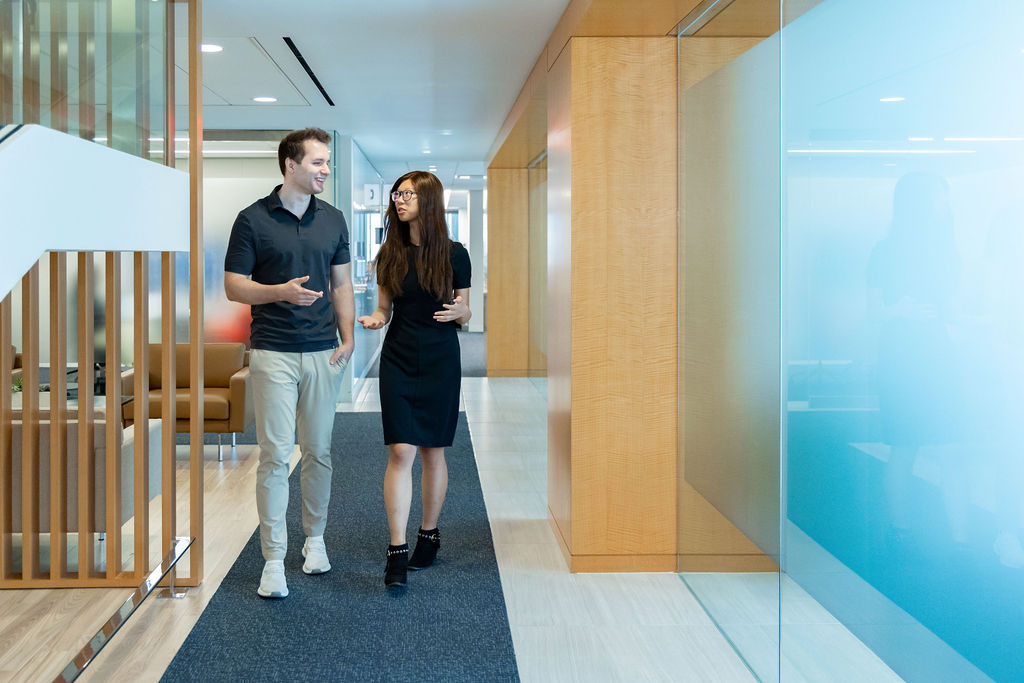Former engineering intern and current team member Crystal sat down to discuss the real-world work interns engage in throughout our summer internship program. Learn more in the interview below about her experience completing challenging and impactful projects as an intern.

Former Intern
Crystal
How would you describe your experience as an intern at Citadel?
I enjoyed it so much that I changed my entire education plan to graduate early so I could come back more quickly.
What about your overall internship experience led to your decision?
By the time I came to Citadel, I had already done internships across a variety of big tech companies and startups. Citadel was my first time really venturing into the finance space. I realized once I got here that the work you do is very similar across any tech company, and what really makes the difference is the culture and the people. Throughout the course of my internship, the people that I met were super engaged, super driven and super intelligent. The culture here is focused on results, and everyone is very committed and accountable to their deadlines and responsibilities. At the same time, they’re also very collaborative. I really enjoy that environment because I think it really allows you to excel through your own initiative, but you never feel alone in your journey.

Let’s talk about the projects you worked on while you were here.
One of the great differences between a Citadel internship versus an internship at a big tech company is here you typically work on more than just one project throughout the course of your internship. This is because of the fast-paced nature of the firm, the huge variety of work that needs to get done, and the flexibility you’re given to drive how you want to contribute. While I was an intern, I got to work on three different projects.
I started off with one about data management, just to get familiar with the system. From there, I worked on two main projects. One was the buildout of a dashboard for the analysts on my team. The other project was a performance optimization problem that was more loosely structured and had a lot of potential to be of really high impact.
Can you talk about the buildout of a dashboard project?
I was working with analysts who were curious to see visualizations between different market prices and their mathematical combinations. I really enjoyed it because it touched on a lot of different technical challenges that I didn’t think I’d ever get to tackle. The end result was a dashboard where the analysts could simply type in what they wanted to see and then it would just clearly display it for them.
Did you build the dashboard?
Yes, I did. I worked on both the back-end — like pulling in the data, figuring out a way to understand what it was conveying, and storing it somewhere — and then also building out the dashboard and the front-end component. It was great to work on a full-stack end-to-end product.
This is not a side project, it’s a project that’s immediately part of the function of the business, isn’t it?
Yeah, a great thing that continues throughout the internship is the culture of rapid iteration, which is always better for an engineer. The end users or analysts sit right next to you, so you get their feedback quickly and can immediately start integrating it into their workflow. Even though I had a very rough, V zero version initially, within a few days I was able to have them directly integrate my work so that I could get quick feedback. I rapidly improved the product to a point where it was usable for them both during and after I left the internship.
Everyone is very committed and responsible and held to their deadlines and responsibilities. And yet, at the same time, they’re also willing to be collaborative.

And is that something that has continued to be utilized, the dashboard?
Yes, actually, when I came back full-time, I visited the team that I interned with, and as I approached them, I saw they were using the dashboard. They jumped up and said, “Crystal, look, I’m using it right now.” That was really great to see.
What kind of conversations were you having about your projects with experienced employees?
It was very interactive, very back and forth. We would often meet together as a team — myself, the end users, my manager, and people who were more familiar with the firm’s technology. They supported me throughout building the projects. We would all scope out what improvements we’d want to see or just generally what the project should look like and bounce ideas back and forth off of each other. I walked out of those meetings with a very clear understanding of what needed to be done, and if I ran into any blockers, I’d know who to reach out to. The analysts also had a better understanding of what they wanted to see out of a UI like this. The other, more experienced technical experts always made themselves very available to me. My mentor and my managers were huge sources of help during the summer.
So, those kinds of interactions were typical?
Yeah, I think that’s very, very common at Citadel. Being an engineering intern, your job is ultimately to build something that will help people who sit maybe two rows away from you. And the best way to do that is always interact with them and get their feedback and understand what their needs are. On the more technical side, I would say that most interns at some point reach out for help in building out their project, and I don’t know any intern who didn’t get that help immediately. That type of cultural expectation in an engineering internship is pretty incredible.
Would you speak a bit more about Citadel’s culture as you experienced it during your internship?
Yeah, absolutely. I would say that one of the things I picked up immediately as an intern was that there is a focus on delivering results fast. Because we have that general goal in mind, everyone understands that a necessary step to get to your end goal is collaboration. Everyone is very collaborative. That is part of the culture that’s pretty unique to the firm. I’ve been an intern at other places where the iteration cycle has been slower, and I would say that I very much prefer what happens here. If you start heading down the wrong path with your work, it allows you to course correct immediately and keep you and your team aligned on the same goals.
Did those types of collaboration help you to learn more during the internship?
Yes, definitely. A lot of my conversations with the analysts would deviate away from what they wanted in a technical sense and instead I would learn a lot about the business itself. This was great because I wanted to understand their underlying motivations for what they were trying to do. I think if you can understand their core needs you can really build out the correct technical tools.
Is there a top reason why you’d recommend someone become an intern here at Citadel?
I think the Citadel internship does a great job allowing you to gain insight into day-to-day life here, because interns are treated exactly the same as full-time employees. The program also allows you a lot of exposure to senior leadership and how they think. The company is led by an amazing set of people.
You also get to network with the other interns who are, across the board, incredible and leaders in their own right. Being able to interact with them and form those relationships is really valuable. In general, I think that the internship is organized really well. You develop a lot, not only technically, but personally. They host a lot of workshops and create opportunities for you to develop your soft skills and professionalism, in addition to your technical skills. It’s a very net positive opportunity.

Is there anything else you want to add?
I’d just add that even if you’re not entirely certain about finance, the internship is the best way to try it out. The team does so much to make you feel at home and to make sure nothing is an issue, like housing or support or project management. None of that is going to be a problem. I just recommend doing the internship.
How would you compare yourself at the start of the internship to the end of the summer?
At the start of the internship, I was somewhat unsure if I wanted to be in finance. I also was less comfortable interacting with people who worked in finance, having relatively little familiarity with the field. But throughout the process, I interacted with the analysts and pushed my boundaries beyond the safe space of academics. By the end of it, I felt very much that I could work in finance and that I was interested in a career in the industry. I felt I had contributed to the firm in a meaningful way, and that was an incredible feeling.
